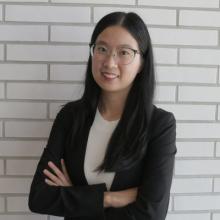Yundi Wang
Why did you decide to pursue a graduate degree?
Being in an environment where I am constantly challenged to think critically and creatively about problems no one has previously found a solution for is what intrigues me about research. A graduate degree not only challenges me on these aspects but grants me the unique opportunity to actively work with my hands, discover and uncover the mysteries of science as well as engage in conversations with an incredibly hardworking and inspirational scientific community from across the world.
Why did you decide to study at UBC?
During my undergraduate degree, I conducted calcium ion channel structure and function research. The variety of electrical signals which exist in the body are generated by the gating of these ion channels. The study of ion channels from a structure-function level, therefore, forms the foundation for the characterization of excitation-contraction coupling in the heart as well as synaptic and axonal transmission of action potentials in the brain. I was therefore interested in learning and building on my understanding of ion channels from a broader systems neuroscience perspective through examining single neuron spikes whose activity is generated by ion channel gating.
What is it specifically, that your program offers, that attracted you?
UBC's Neuroscience program not only consistently ranks within the top of Canada and globally but is also home to numerous world-class faculty researchers. The interdisciplinary and collaborative approach that the neuroscience community at UBC takes creates a tremendous opportunity and it is an incredible privilege as a student to be able to connect, learn, and be taught by the many experts in the field.
What was the best surprise about UBC or life in Vancouver?
The campus and city are every bit as breathtaking and beautiful as the pictures on the internet show. Even if you do not have time to explore Vancouver, there is plenty to explore on campus –the Rose Garden, Museum of Anthropology and Nitobe Memorial Garden to name a few.
What aspects of your life or career before now have best prepared you for your UBC graduate program?
During my undergraduate degree I volunteered and worked in various labs where I was able to learn basic skills such as but not exclusive to cell culture, DNA preparation and site-directed mutagenesis which I use even today during my graduate degree. Staying actively involved in both the university and the local community through a number of different volunteer positions and societies have helped build my communication and organizational skills as well as connected me with opportunities to develop my research skills. I would not be where I am today without the community which taught and fostered me so thank you to all my mentors, teachers, faculty members, researchers, friends and family.
What do you like to do for fun or relaxation?
Giving back to society through volunteering is not only a wonderful way to meet new individuals but generates within me a sense of warmth and community. As an advocate and ally for BIPOC and the LGBTQIA2S+ communities, I strive to create equity, diversity, and inclusion in the research community and broader society. Beyond volunteering as a crisis line operator, UBC Graduate Student Ambassador, and many other positions I can be found engaging in hobbies that involve working with my hands, for instance through baking, drawing, painting, or playing the piano.
What advice do you have for new graduate students?
The first semester in a new city, province, and/or maybe even a new country will be challenging. Give yourself both the time and space to adjust to a new lifestyle - find a hobby you enjoy doing for example and get involved at UBC and/or your local community!
